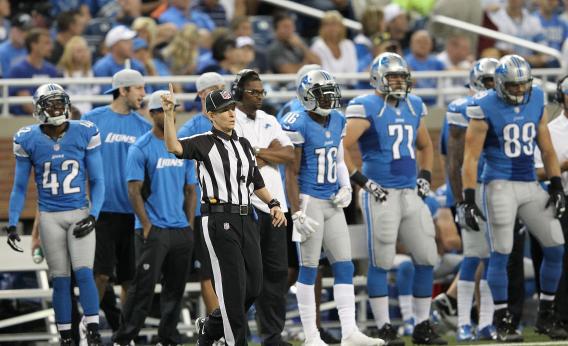Being a modern football fan can be a worrisome enterprise, plagued with concerns about ugly labor disputes and lockouts, frustrations over publicly financed stadiums, and most of all, grave concern about whether the game can be played without destroying the brains of the men who play it. But while the first weekend of NFL play this year made no contributions to solving any of those lingering problems or resolving the lockout that kept the league’s referees off the playing field, this NFL season has kicked off with a number of events that suggest players are moving beyond two other persistent problems for the league: gender discrimination and homophobia.
“Women are more honest and fair than men and they know how to catch a man cheating,” Larry Foote, a linebacker for the Pittsburgh Steelers, said about the Sunday debut of Shannon Eastin, the first woman to officiate an NFL regular season game. and the desirability of having women call NFL games more generally. That rationale may be based in some Steve Harvey-level tropes about men, women, and behavioral science. But even if the idea itself is silly, it comes from an admirable impulse. It might have been better for Foote to talk about how men and women are equally capable of keeping their eyes on the ball. But at least he was motivated to come up with a reason to praise women’s arrival in the league rather than to cling to traditionalism, though he did add the caveat that “I hope she’s just a line judge. Don’t want her to get hurt.”
And Foote isn’t alone. Players have shaken Eastin’s hand. Coaches have praised her for making special efforts to communicate. There are reasons to criticize Eastin, most prominent among them that she is crossing a picket line, and it’s deeply disappointing that the first female referee made it to the NFL as a result of a labor dispute. But nobody seems to have felt the need to defend the NFL as a man’s domain against Eastin’s arrival on the field.
That same ease and confidence—lacking in prior generations of male athletes, officials and fans who disparaged female umpires in baseball or spit homophobic epithets at each other—is also present in Minnesota Vikings punter Chris Kluwe’s letter to a Maryland lawmaker who asked that the Baltimore Ravens crack down on linebacker Brendon Ayanbadejo’s support for a bill that would give gay state residents equal marriage rights. In the worldview Kluwe laid out, it’s terror of homosexuality that’s risible and embarrassing, not gay people themselves. “I can assure you that gay people getting married will have zero effect on your life,” he wrote to Emmett Burns, a Democratic member of Maryland’s House of Delegates. “They won’t come into your house and steal your children…They won’t even overthrow the government in an orgy of hedonistic debauchery because all of a sudden they have the same legal rights as the other 90 percent of our population.” Kluwe’s letter lead Burns to walk back his position, noting that “Upon reflection, he has his First Amendment rights.”
Now, as outspoken advocates for gay rights, Kluwe and Ayanbadejo are the exception, rather than the rule. And there are still no active male professional athletes who are out of the closet. But Kluwe and Ayanbadejo’s utter comfort, and seeming lack of concern about social sanction in the locker room or on the field, suggests that America’s favorite sport is increasingly reflecting American ideas about gay couples, just as Eastin’s surprisingly easy arrival in the NFL is putting to rest outmoded conceptions of football as a solely masculine space.
Having a woman be the final authority on certain events in the game, it turns out, doesn’t make the gridiron any less intense or exciting, just as donning pink gear to raise breast cancer awareness hasn’t made the men who compete on it any less forceful. And supporting the right of men and women who love each other to marry and be treated equally has no impact on how a quarterback makes decisions in the pocket or how hard a linebacker hits. For some of us who are sitting in the stands or obsessively refreshing our fantasy statistics this season, Larry Foote, Chris Kluwe, Brendon Ayanbadejo, and other players who are helping move football beyond the sexism and the homophobia of the past are worth rooting for, even if they don’t wear our colors, or rack up points in our rosters.
